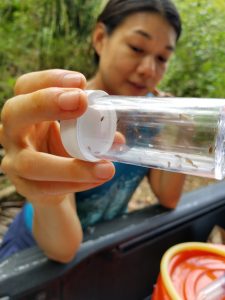
The W.M. Keck Foundation has awarded $1 million to support a groundbreaking University of Hawaiʻi project that establishes the Waimea watershed on the north shore of Oʻahu, Hawaiʻi as a model microbiome mesocosm—that is, a study site small enough to thoroughly investigate but large enough to reveal the complexities of natural systems. This is the first time an entire watershed, ridge to reef, has been studied to map its microbial communities and their ecosystem processes.
“The W.M. Keck Foundation is noted for rewarding cutting edge, high-risk high-reward science that often can’t be funded by federal agencies which can be more risk averse,” UH President and Interim UH Mānoa Chancellor David Lassner said. “This award recognizes the capacity UH has built in the microbiome sphere with world class researchers. Thanks to the immense technological innovations in DNA sequencing and this award, some of our best interdisciplinary scholars can shine a bright floodlight on the previously hidden world of microbes and its fundamental role in shaping healthy ecosystems.”
Led by Margaret McFall-Ngai, director of the UH Pacific Biosciences Research Center, the Keck award supports the work of a cross-disciplinary team of UH researchers, Anthony Amend, Nicole Hynson, Camilo Mora, Craig Nelson and Joanne Yew.
The importance of the microbial world
In the last 10 years, the field of biology has undergone a revolution with the recognition that the microbial world is critical to all aspects of human and environmental health. Multicellular organisms rely upon microbial partners (now estimated at as many as 1 trillion species) to metabolize food, fight off disease, and to run the machinery that sustains the air we breathe, the water we drink and soil under our feet.
“Advancing our understanding of the microbial world will allow us to harness the power of the diverse microbes that represent an untapped natural resource whose potential contributions to health, food production and habitat restoration constitute the greatest opportunity for biological sciences in decades,” said McFall-Ngai. “With ecosystems and the life they support imperiled worldwide, it is critical that we quickly improve our understanding of the dynamics of our planetʻs microbial foundation.”
Nicole Hynson, associate professor in the Pacific Biosciences Research Center at UH Mānoa and member of the team receiving the Keck award, said, “Together, we seek to illuminate the diversity and function of microbes within Hawaiian ecosystems to examine whether their roles are conserved across hosts and environments and the extent to which disturbances alter the functioning of microbially-mediated processes.”
Due to its high ecological diversity across tractable areas of land and sea, Hawaiʻi provides a model system for the study of complex microbial communities and the processes they mediate. With more than a dozen microbial researchers, led by three members of the National Academy of Sciences, including McFall-Ngai, UH is a veritable microbiome powerhouse. WMKF supported work is further complemented by the work of UH Mānoa’s Center for Microbiome Analysis through Island Knowledge and Investigation, a consortium of early career faculty at UH Mānoa spanning the fields of ecology, geoscience, mathematics, molecular biology to engineering and biomedicine exploring the critical role microbiomes play.
This is the second award from the W.M. Keck Foundation in the last year.
See more images in the UH Foundation flickr albums: Hynson Lab and C-MAIKI Waimea Botanical Garden.

